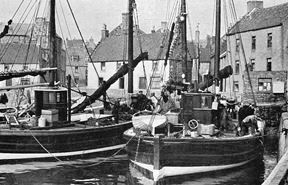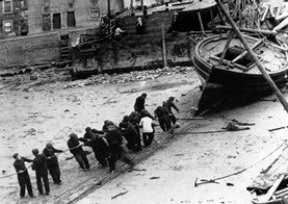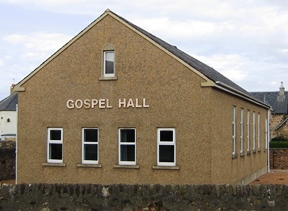A History of the St Monans Assembly
 The history of the St Monans assembly can be traced back to the autumn of 1924, when St Monans on the East Fife coast was a very busy fishing village. For several years before this, there had been a remarkable work of grace in fishing communities stretching from Wick in the north to Great Yarmouth in the south, often now referred to as the Jock Troup revival, for this former cooper was the main preacher whom God used mightily. Many East Fife fishermen and their womenfolk were deeply touched by the gospel as they followed the seasonal herring fishings in the north during the summer, and in the south in late autumn. Many were saved, and some were also baptised in these places, while others were saved and baptised locally as the gospel was preached in churches, halls and in the open air. Here are some details of these early days.
The history of the St Monans assembly can be traced back to the autumn of 1924, when St Monans on the East Fife coast was a very busy fishing village. For several years before this, there had been a remarkable work of grace in fishing communities stretching from Wick in the north to Great Yarmouth in the south, often now referred to as the Jock Troup revival, for this former cooper was the main preacher whom God used mightily. Many East Fife fishermen and their womenfolk were deeply touched by the gospel as they followed the seasonal herring fishings in the north during the summer, and in the south in late autumn. Many were saved, and some were also baptised in these places, while others were saved and baptised locally as the gospel was preached in churches, halls and in the open air. Here are some details of these early days.
 A local fisherman called John Smith was sent to the Firth of Clyde in charge of a minesweeper during the 1914-18 war. He had been saved, and then recently baptised in the Baptist Church at Fraserburgh while fishing there. On weekend leave at Ardrossan, he went ashore in search of fellowship with believers. A lady "happened" to see him with his Bible in his pocket and asked where he was going. "I'm seekin' somewhere according to scripture," he replied. She invited him to a Bible Reading that night. On the Lord's Day he returned and witnessed the breaking of bread. "I've found what I’ve been seekin' all along," he exclaimed. He applied for fellowship and was received into that assembly. Over the next few years, following the herring shoals around the coast he found fellowship in assemblies in the different ports he visited. When at home, John with two other brethren, Rob Smith and Alex Balfour, regularly cycled 12 miles over a long hill to St Andrews where the nearest assembly was at that time. They remembered the Lord with the believers there, then cycled 12 miles back again. A Baptist Church was in Pittenweem, two miles away, and several St Monans believers were baptised there.
A local fisherman called John Smith was sent to the Firth of Clyde in charge of a minesweeper during the 1914-18 war. He had been saved, and then recently baptised in the Baptist Church at Fraserburgh while fishing there. On weekend leave at Ardrossan, he went ashore in search of fellowship with believers. A lady "happened" to see him with his Bible in his pocket and asked where he was going. "I'm seekin' somewhere according to scripture," he replied. She invited him to a Bible Reading that night. On the Lord's Day he returned and witnessed the breaking of bread. "I've found what I’ve been seekin' all along," he exclaimed. He applied for fellowship and was received into that assembly. Over the next few years, following the herring shoals around the coast he found fellowship in assemblies in the different ports he visited. When at home, John with two other brethren, Rob Smith and Alex Balfour, regularly cycled 12 miles over a long hill to St Andrews where the nearest assembly was at that time. They remembered the Lord with the believers there, then cycled 12 miles back again. A Baptist Church was in Pittenweem, two miles away, and several St Monans believers were baptised there.
Early Beginnings
In the autumn of 1923, John met a Scottish evangelist called Arthur Gilmour at Great Yarmouth and invited him to St Monans. For two weeks he held gospel meetings in John's home, just across the road from the present Gospel Hall. Six souls were saved. Later, another evangelist, Jack Roberts, came and pitched his gospel tent on a nearby piece of common ground (“The Mair”) where fishermen spread and dried their nets. Meetings were held for young and old, and a few more were saved. They also heard baptism, separation and church principles taught from the Scriptures.
At the start of his tent work, Mr Roberts was invited to stay with Mr and Mrs James Ferguson who owned a bakery in the adjacent street. James Ferguson himself had just been saved in the local Congregational Church. He had been quite a man of the world, keen and skilful alike on the football field and at the draughts-board. On the night he was saved, he pointed to few elderly folk making their way to the evening service and said to his wife, "See these old folk? That's what the kirk's for – no' for the likes o' me!" But that evening, God's Word reached his heart and he became a changed man.
The preacher in the Congregational Church during these eventful years was Mr Thomson, a brother with experience of assemblies else¬where. He had come to St Monans to work as a builder, but when the minister became ill he was invited to take over the preaching which he continued to do after the minister died. He preached a sound gospel, and led Bible studies where the need for baptism and the weekly observance of the Lord's Supper were explained.
As a result of this, in the summer of 1924 a number of believers severed their links with the Congregational Church and gathered to the Lord's name in a scripturally-based local assembly. Among them were Mr and Mrs John Allan, Mr and Mrs David Cargill, Mr and Mrs James Ferguson, and Mr and Mrs James Gowans. James Gowans had been saved in a submarine, far beneath the sea, while on naval service. David Cargill also had been saved at sea, riding out a storm in the family fishing boat Endeavour while reading a copy of The Traveller's Guide, thoughtfully placed in his bunk by his brother John.
The believers first met in the Fergusons’ home for the breaking of bread, prayer and preaching. Often extra prayer meetings were held in the flour-loft above the bakehouse. Then with the help of Jack Roberts, a large hut from the naval base at Rosyth was acquired. Dismantled and brought to St Monans, covered in tar and oil, it was cleaned and painted by the brethren themselves, most of them fishermen briefly at home between their summer and autumn fishings. By the time it was ready for use most of the brethren and sisters had gone to Yarmouth for the autumn fishing. Thus it was that round the table on that first Lord's Day morning in the first Gospel Hall only six believers met to remember the Lord. In early December the boats returned home so numbers increased significantly, and were further augmented shortly afterwards when twelve believers, some in their early teens, were baptised one night at a special meeting held in Union Hall, Cowdenbeath.
The assembly continued to meet in the wooden hall with its corrugated iron roof in a back lane behind George Terrace for 32 years, heated by a single cast iron stove in the centre. During these years remarkable local gift for preaching and teaching was encouraged and developed. Sadly, some left the fellowship having “received new light”, but others were added, including families of many of the original couples. Baptisms took place in the sea even in winter, up until 1953.
The Present Gospel Hall
 In 1956, with around 55 believers in fellowship, the present Gospel Hall was built on a new site in the centre of the village. It cost around £4,500, a large sum in those days which working men sacrificially provided from their very modest incomes, for no appeals were made for outside help or finance, and there was no debt. On 16th June 1956 the local believers first met in the new hall for a time of prayer and thanksgiving with appropriate short messages given by James Gowans, James Ferguson, Bob Cargill, David Fyall, and Alex Allan. Over the next weekend around 300 believers from far and near gathered for the Opening Conference. There were nine visiting preachers, well known from previous years of fellowship - Michael Grant, Aaron Whitefield, William Currie, John Douglas, Isaac Cherry, David Mckinnon, William Steedman, William Gaw, James Paton.
In 1956, with around 55 believers in fellowship, the present Gospel Hall was built on a new site in the centre of the village. It cost around £4,500, a large sum in those days which working men sacrificially provided from their very modest incomes, for no appeals were made for outside help or finance, and there was no debt. On 16th June 1956 the local believers first met in the new hall for a time of prayer and thanksgiving with appropriate short messages given by James Gowans, James Ferguson, Bob Cargill, David Fyall, and Alex Allan. Over the next weekend around 300 believers from far and near gathered for the Opening Conference. There were nine visiting preachers, well known from previous years of fellowship - Michael Grant, Aaron Whitefield, William Currie, John Douglas, Isaac Cherry, David Mckinnon, William Steedman, William Gaw, James Paton.
For many years before this, an annual weekend conference had become established in December, with up to 500 visitors coming from many parts of the country by train and by busloads to hear gifted brethren teaching the Word of God. In 1960 the date was moved to September to eliminate the hazards of winter travel. This conference continues to the present day with annual attendances now around 150. Over the years, there were open air meetings all year round, some in nearby villages during the summer, a thriving Sunday School and Children’s Meetings in two locations, Bible Classes for teenagers, and Bible Readings on Saturday evenings which continued into the 1980s. A meeting for Prayer and Bible Study is now held on Monday evenings, and there are monthly ministry meetings on Saturdays during the winter which attract good attendances from neighbouring assemblies. Missionary work abroad and evangelistic efforts in the UK have also been well supported over the years, with encouraging reports received regularly to stimulate prayer.
This village of less than 1400 people was at one time called by its neighbours “The Holy City” because eight different groups, large and small, met on Sundays. Now there are only three. Numbers in the assembly have also fallen considerably over recent decades. Older believers have been called home, and the general trend in the UK towards materialism and apathy to the gospel has had its effect. But the assembly continues to witness for the Lord with a weekly Gospel Service, regular tract distribution, meetings in three Care Homes, and a summer Holiday Club for children. Weekly Gospel Services in the Gospel Hall which still exists in St Andrews are also encouraged and supported.

This text is written in beautiful script on the wall above our pulpit.
We gather in His name.
In all we do we want to honour Him as our Lord.




